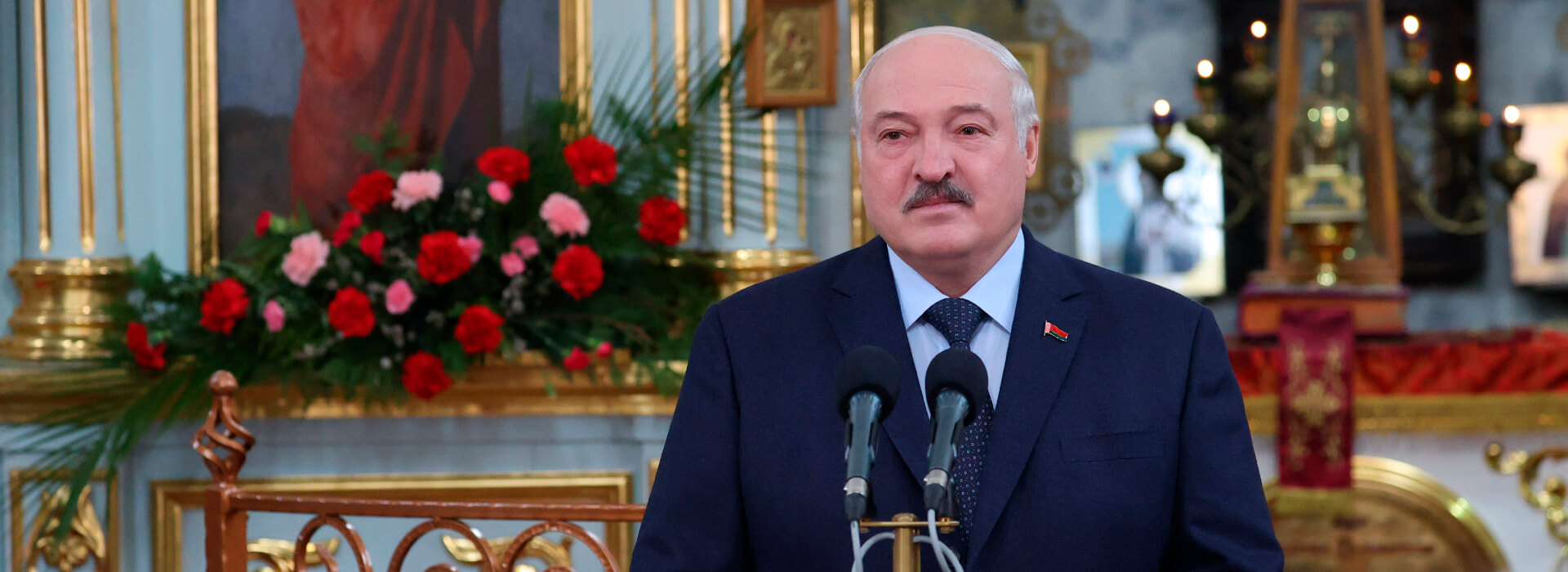Is the Belarusian Dictatorship Doomed?
The United States and its European Allies must prepare to replace a European dictator with a democracy.
Belarusian dictator Alexander Lukashenko is the only European leader to have help power longer than Vladimir Putin—but perhaps not for much longer. His return to the public spotlight on Monday has not quieted suspicion that he is gravely ill.
Lukashenko, age 68, was reportedly hospitalized last week after appearing weak during Victory Day celebrations in Moscow on May 9. Reuters reported that he looked “tired and a little unsteady on his feet, and a bandage was visible on his right hand. . . though he otherwise showed no obvious signs of being unwell.” Footage of him on Belarusian state media Monday, likely intended to dispel speculation that he was incapacitated, instead reignited talk that he’s on his way out.
The possibility that Lukashenko’s days are numbered offers hope and opportunity, as well as concern and risk. The United States and its European allies should be prepared for the day when Lukashenko leaves power, however and whenever that may come.
For starters, the United States and its allies should reiterate their support for Belarus’s sovereignty and independence, and for Svetlana Tsikhanovskaya to be acting president. She won the 2020 presidential election but was then forced to flee to neighboring Lithuania after Lukashenko fraudulently declared victory. Most countries don’t recognize Lukashenko as the legitimate leader of Belarus, and his departure from the scene would open the possibility for Tsikhanovskaya to return to Minsk.
The West should also offer a major assistance package to help Belarus take its rightful place in Europe, alongside Ukraine and Moldova, free from Putin’s sphere of influence. It should also warn Moscow that it’s up to Belarusians, not the Kremlin, to choose their own leaders and their country’s future.
Tsikhanovskaya has made clear her intention to serve as a transitional figure, so the United States and its European friends should be prepared to support new elections with proper international monitoring. Belarusians would have the opportunity to elect their leader democratically for the first time in nearly three decades.
But therein lies the risk. Putin has undoubtedly been planning for the day when Lukashenko is no longer around, and may be ready to send in the Russian National Guard or call for an armed intervention by the Collective Security Treaty Organization, of which Belarus is a member, to prevent a democratic transition in Belarus. He may support efforts to seize power by Lukashenka’s “Security Council”—formally led by Nataliya Kachanova, speaker of the upper house of the “parliament”—so that the hardliners who have carried out Lukashenko’s orders for decades can perpetuate his illegitimate regime.
Putin will do all he can to rig a post-Lukashenko period in Belarus in his favor, though his ability will be limited by the exigencies he faces from his unprovoked war against Ukraine. He cannot afford to lose his like-minded colleague in Minsk, but he has his hands full with his self-made Ukrainian crisis. Belarusians may see an opening for their country to take a democratic turn for the first time since 1994, when Lukashenko came to power.
Even if Lukashenko survives and remains in power, the recent reports about his illness will loosen his grip on power and stir machinations about a post-Lukashenko period. Belarusians will view him as weakened, no longer invincible, with the end of his tenure just a matter of time. Challenges to his power will increase and invigorate those who yearn for a better, brighter future.
Lukashenko allowed Russian forces to stage part of their initial invasion last February from Belarusian territory, making Lukashenka complicit in the subsequent war crimes and genocide, as noted in a recent resolution of the Parliamentary Assembly of the Council of Europe. More recently, he has acquiesced to Putin’s desire to station tactical nuclear weapons on Belarusian soil, which many Belarusians opposed. Lukashenko’s departure would be good news for Ukraine as it would remove concerns of major Russian military moves, conventional or nuclear, from Belarus, enabling Ukrainian forces to concentrate on Russian positions in the Donbas and Crimea.
Before the reports of Lukashenko’s ill health, many thought that a Ukrainian victory and Russian defeat would embolden the people of Belarus and trigger the end of Lukashenko’s regime. Now, the demise of Lukashenko may help Ukraine achieve victory.
Lukashenka’s departure would end nearly three decades of repressive rule and open the possibility for a more democratic future for Belarus. This would end the nightmare for millions of Belarusians, many of whom protested his theft of the 2020 presidential election. The following crackdown—the most brutal and thorough repression of critics, journalists, and activists in Belarus’ post-Soviet history—made Lukashenko illegitimate in the eyes not only of most Belarusians, but also almost the entire international community—except Putin.
As reports of Lukashenko’s hospitalization surfaced, news came that Belarusian blogger and political prisoner Mikalai Klimovich died in custody at a penal colony in Belarus’s Vitsebsk region. Thousands of others have been imprisoned for their protest against Lukashenko’s continued rule or their news coverage of his illegitimate reign.
Roman Protasevich, a journalist whose flight over Belarusian territory Lukashenko forced down in 2021, was sentenced to eight years in prison for “slandering” Lukashenko. Another blogger, Igor Losik, who also contributes to Radio Free Europe/Radio Liberty, suffers in a Belarusian prison, as does Nobel Peace Prize Winner Ales Bialiatski, who was sentenced to 10 years in prison on absurd smuggling charges.
Lukashenko’s departure cannot come soon enough.
The West can and should help bring about an end to the brutal Lukashenka regime, striking a blow against authoritarianism and Putinism and a victory, at long last, for Ukraine, for democracy, and for the long-suffering people of Belarus.










